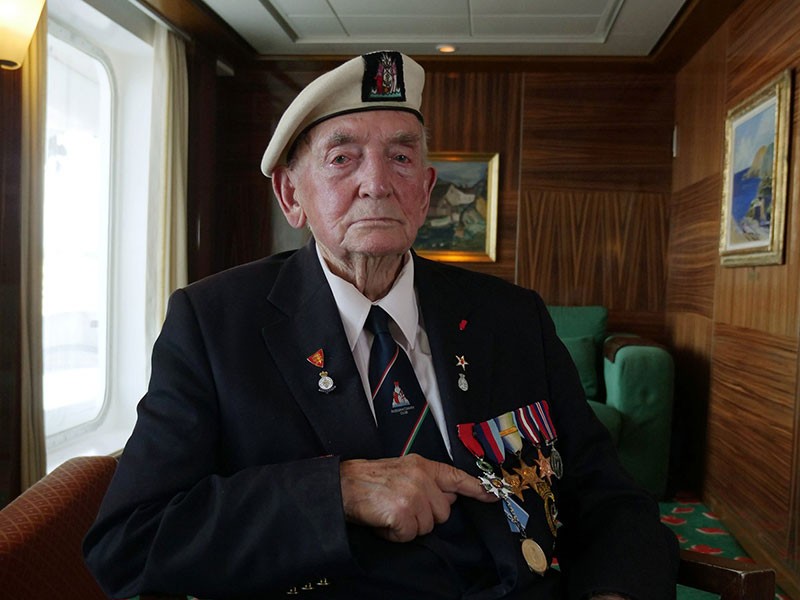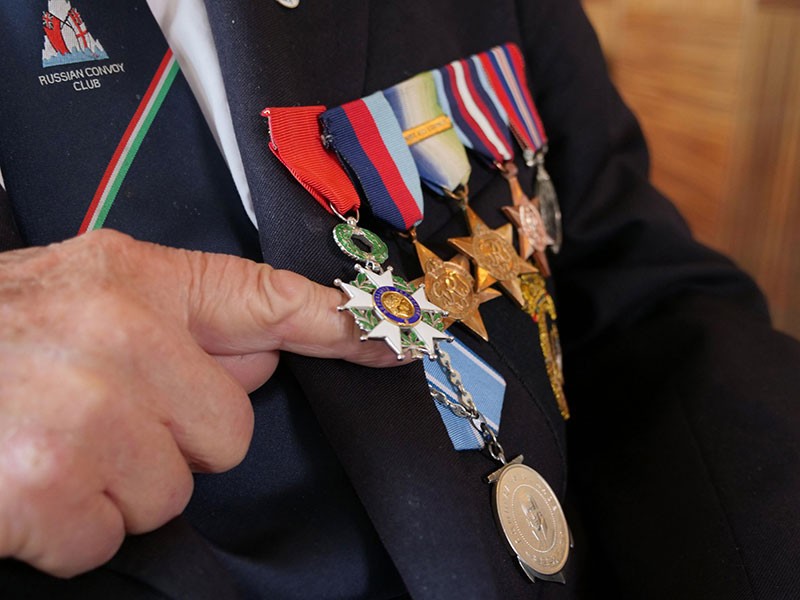ABOARD THE BOUDICCA, England — Donald Hitchcock is a proud British veteran, but he's desperate to spend D-Day on Omaha Beach with the Americans he served alongside. He also wants to honor the sacrifice of Americans he believes saved his country from the Nazis.
Hitchcock is taking part in a commemorative cruise that will take some 300 British veterans to Normandy for D-Day commemorations on beaches like Sword, where British and Commonwealth troops led the way. But he's looking for a ride to Omaha, where Americans bore the brunt of the fighting.
"We would have not come out successful but for American aid," said Hitchcock, 94, who served on a Royal Navy frigate that escorted U.S. troop ships on D-Day. "American ships. American men. American dedication."
About 160,000 Allied troops stormed the beaches on June 6, 1944, with more than 2 million taking part in the campaign before they broke out of Normandy and started their march to Paris. More than 4,400 Allied servicemen were killed on D-Day alone, including 2,501 Americans.
Hitchcock's connection with the Americans began on June 7, when the young sailor and his shipmates aboard the frigate HMS Narborough rescued Army Rangers from the USS Susan B. Anthony after it struck a mine off Omaha Beach. The ship was lost, but all of the 2,288 soldiers on board survived.
As Hitchcock sees it, he was just returning the favor to the Americans. His ship and others like it were built by the U.S. and transferred to the Royal Navy as part of the lend-lease program that supplied Britain with food and weapons throughout the war.
"I believe we have a debt of gratitude to the Americans for building the state-of-the-art escort destroyers for lend-lease, which helped us," he said.
Now Hitchcock needs help to get to Omaha Beach.
Getting from the one beach to another is much more complicated than it sounds. Normandy's narrow, windy roads are strictly controlled during D-Day events because of the huge crowds taking part in the services. Such restrictions are especially difficult for older people because mobility issues make it hard to get to the beaches without a car.
Hitchcock was thrilled when he heard another veteran taking part in the cruise, and possibly a third, also wanted to go to Omaha. With strength in numbers, he's hoping a solution will be found.
It's hard to bet against Hitchcock's determination. At 94, he still stands expressly upright, and flatly ignores suggestions that he use the elevator instead of the stairs. Staying young means staying fit, he explains. Daughter Trudi, a nurse, just smiles, nods, and tries to keep up.
After the war, Hitchcock got married, had four children and became a lecturer in geography. He still has that professorial air about him, and has clearly thought deeply about D-Day, and the fact that it brought like-minded nations together to fight tyranny.
As a man of letters would do, he wrote a poem about his experiences, and hopes to read it on D-Day. At Omaha Beach. To Americans. On behalf of all Britons, and especially those seamen who gave their lives for each other and their country.
And he really wants to do it this year, on the 75th anniversary of the invasion, because he fears it may be his last chance. He worries D-Day will be forgotten and future generations will consign the whole thing to history when the last of the survivors has gone.
The poem reads, in part:
We who remain remember, those friends who shared a life
Of white capped waves and wind-whipped spray
That spread our duffles with a cruel knife ...
An old man now stands on that sodden shore
Looking out where he once looked in
He remains to remember the sights of sinkings
Of unknown men caressed by the tide
They came from afar and soon they left us
Omaha is the place where they died
Their Styx was our Channel, nowhere to hide.
Now it is empty. Endeavor has gone
He remains to remember alone, not yet gone.
If Hitchcock fails to get to Omaha Beach, he has another plan.
"If I can't go there, I'll have to think it. I have a very good visual memory. I will have to visualize it," he said.
"I will just switch it on. Omaha. Omaha."










